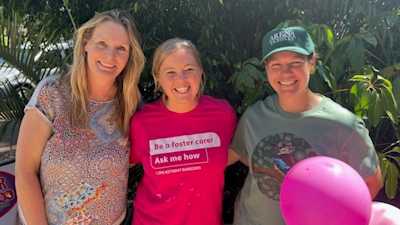When parents have no one left to turn to, our family workers are there to help keep kids at home and out of foster care

All the evidence tells us that the best place for a child is to be living with their family. As a foster care agency, we know this isn’t always possible but in Hobart, our Intensive Family Engagement Service (IFES) are doing all they can to keep families together.
Life Without Barriers’ IFES team provides assertive support to parents who are at risk of having their children removed by Child Safety Services in Tasmania. In the past these children would have entered the foster care system, but now the Tasmanian Government is piloting a new model of care. This new model brings agencies like Life Without Barriers into the home to provide practical support for up to 20 hours per week so that parents can make the changes necessary to keep their children in their care.
Will Skadden, the Team Leader for the IFES team recognises both the strengths and challenges of the service they provide. “Even though we are intervening before kids are removed, this intervention is still quite late in terms of the issues faced by the family,” Skadden said. “Families often come into the service having dealt with a lot of different services, some that they didn’t like, so they can be sceptical of us."
"So it is a real point of emphasis for us to build positive relationships right from the start. A lot of the initial work is collaborative goal setting. The good thing about our service is we can be a bit flexible about what we work on.”
— Will Skadden, IFES Team Leader

Image: IFES Team Leader Will Skadden
The work is intensive, with each family worker carrying a case load of just four families. The family workers follow the evidence-informed Parenting Under Pressure model developed by Griffith University which focuses on emotional regulation, nurturance and view of self. Often parents have limited support from extended family, some have issues with substance abuse and many have been victims of intergenerational trauma and domestic violence. So the family workers have to wear many ‘hats’.
Family workers help to solve some of the short and long term problems experienced by the parents. They teach parenting skills and provide mental health support. They organise activities to help the families build positive experiences together and provide respite by working one-on-one with the children too. Family workers organise mentors for the children and work with alternate education providers to get the kids re-engaged in school and spending time with the right kinds of peers.

Image: Two young girls with curly blonde hair are sitting in a class room, in school uniform, smiling at each other.
They are the problem solvers in what is often a very chaotic and volatile family environment. When there is a crisis, the family worker is the first one called and their support is practical and immediate.
Tara is a single mother who has recently had her children restored to her care thanks to the support of the IFES team. She admits it was hard to have another unfamiliar service enter their lives but after working with the team for a number of months, she can see how much has changed for the better. “My seven year old was out of school for the last year, but they’ve helped him get back in school and he’s doing really well," Tara said.
“The kids just think it’s great. Because I’ve got no family here, it’s really hard and it’s been really hard for a long time now. I’d be lost without them.”
— Tara, supported by the IFES team

Image: With the support of the IFES, Tara's children have been restored to her care and are back in school.
When Tara was unexpectedly admitted to hospital recently for a two day stay, and it was her IFES family worker who came to stay with the children. “They are my only support system at the moment. Anything I need or need help with they say just yell out and they sort it out for me. It’s really great for people who don’t have that family support. They’ve helped me and I appreciate everything they’ve done for me. I can’t thank them enough. We still have a long way to go, but we’ll get there, slow and steady.”
Family worker David Taylor recognises the complexities faced by the families he works with. “We find when we meet the families the issues we were told about are usually just the tip of the iceberg. It’s quite a complex life,” Taylor said. “There can be issues around safety in the home, nurturing and attachment, cleanliness, hygiene, domestic violence, sexual abuse. So in that initial stage of relationship building we get caught up in putting out a lot of spot fires.” After a time though, he sees a shift in the parents and a strong willingness to change as they come to know him and understand he is there to support them and help them get on with their lives.
While it has its challenges, the rewards in helping create lasting change for children and families make it all worth it.
“I love my job, I think it’s the best job I’ve ever had in my life. Although it is only a short time we get to work with these families, I am confident that I can make a little bit of difference and hopefully turn things around for them.”
— Dave, Family Worker with the IFES team
When asked about success rates, Skadden notes that success rates are hard to measure in this type of work. About 75% of the families they work with continue to keep their children at home. For those whose children are removed, it doesn’t necessarily mean the team was unsuccessful, but that it was in the best interest of the child for them to be cared for elsewhere for a time. “Our hope is that any removals would be temporary and then this program will help parents take the steps they need to then get their children back,” Skadden said.
The program is a pilot program currently funded by the Child Safety Services in Tasmania. Life Without Barriers hopes to continue to deliver this service as we are committed to child first practices, which include children remaining or being reunited with their families wherever possible.


